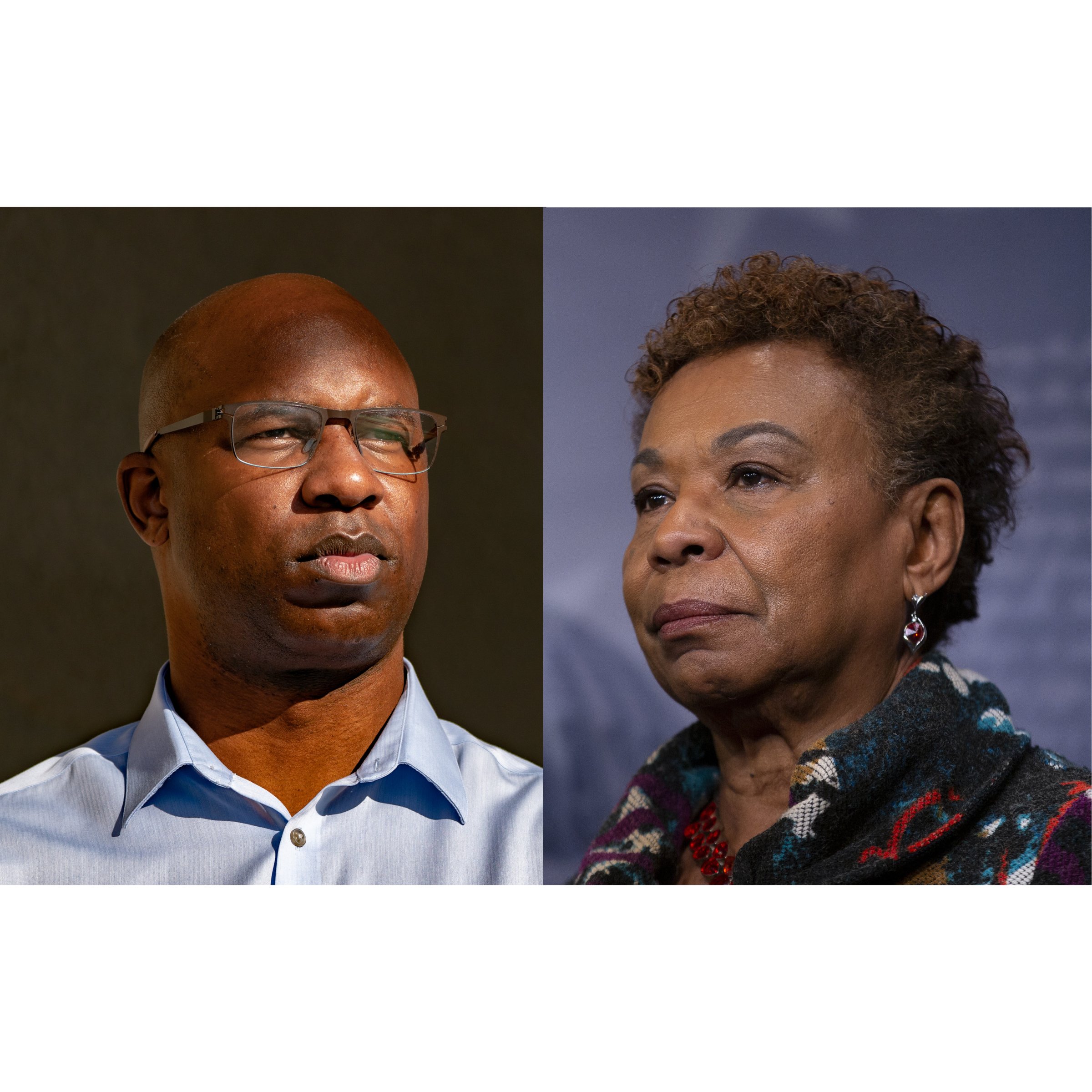
When Jamaal Bowman won his June primary to represent parts of the Bronx and Westchester County in Congress, he became the latest young progressive whose election shook up Washington, D.C. But that new wave—whose most prominent member is Alexandria Ocasio-Cortez—is following in the footsteps of many elder leaders. Longtime Representative Barbara Lee has been a force on Capitol Hill for decades, first as a staffer and now as a member of Congress representing California’s Bay Area. Lee, who’s now in her 12th term, is one of the body’s most outspoken progressive lawmakers. The two met on Zoom to discuss the rising influence of American progressives and how public policy can fight systemic oppression.
Jamaal Bowman: We’ve had many conversations since I won the [primary], so I want to thank you first and foremost for opening your doors and being supportive of me as I’m learning the ropes. Can you speak about how you survived in Washington for over two decades as a progressive Black woman?
Barbara Lee: First of all, let me just congratulate you once again. You’re going to hit the ground running. I started, actually, in the mid-’70s, when I got involved in politics through the Honorable Shirley Chisholm. I learned a lot from her because she was the first African-American woman elected to Congress. It was like you would not believe—talk about sexist and racist. But she held her head up and she was brilliant, and she moved her agenda and represented her constituents in a magnificent way. These individuals were fighting for what we’re still fighting for: systemic change. And so they challenged the racist system. They challenged the system of inequality. In terms of capitalism, in terms of economic inequality, they challenged it all at the core.
And so fast-forward to today; for me, this is normal. You can’t start in the middle when you’re trying to pass a policy. You have to be thinking strategically about where you want to go to make systemic change, and that’s how I’ve been able to be myself.
JB: I feel like a member of “the squad” coming to get Barbara Lee’s back, to fight alongside her, and to strategize with her along, and the other true progressives in Congress. We’re living in a time where if we’re not bold we’re not going to survive.
BL: Jamaal, they call me the OG. I worked with the Black Panther Party, too. But this is your time. This is a marathon, and you’re running your lap of the race in Congress.
JB: The reason why I decided to run for office is, I was tired of our children suffering and dying in the streets. When I founded my school, we didn’t hire police to come into our schools. We focused on hiring school counselors, social workers and mental-health professionals to provide the support that our kids needed within communities that have been historically neglected. That’s the policy point right there: How do we defund and demilitarize the police and reallocate those resources for mental-health support, not just in our schools but in our communities?
BL: My background is in mental health. I’m a psychiatric social worker by profession. What you said is just so true. Black and brown children are traumatized to their core because of the system of injustice. During the brutal snatching of children from their families at the border, I went down several times to McAllen, Texas; to El Paso; and to San Diego. I went into some of these jails and prison camps where they were holding children. The trauma that these kids face is devastating. African Americans know the generational trauma from children being taken from their parents during slavery. So it became an intersectional issue where we were fighting against this Administration for taking children from their parents, but also fighting for trauma-related care in the mental-health system.
JB: All these issues are intersectional. Immigration policy connects to the refugee crisis, which connects to what’s happening with climate and our military’s contribution to climate change. So we need to truly center human rights in all foreign and domestic policy—truly center people over profit.
BL: The other part of the real excitement I have with you coming to Congress now is that I don’t have to explain what inter sectionality means. The members are learning about [it], but it wasn’t until this last Congress. I had to drill down on Kimberlé Crenshaw, who coined inter sectionality. And now you’ll be there, speaking like it’s no big deal to you.
The movement for Black lives, our Dreamers, young people who hit the streets, regardless of their background, they have pushed us. We’ve made a quantum leap, and as a result of that you now hear people talking about systemic racism in Congress.
JB: There’s definitely a shift happening, but as we say in baseball, momentum is only as good as your next starting pitcher. So we got to keep the work going.
Moderated by Justin Worland
More Must-Reads from TIME
- Where Trump 2.0 Will Differ From 1.0
- How Elon Musk Became a Kingmaker
- The Power—And Limits—of Peer Support
- The 100 Must-Read Books of 2024
- Column: If Optimism Feels Ridiculous Now, Try Hope
- The Future of Climate Action Is Trade Policy
- FX’s Say Nothing Is the Must-Watch Political Thriller of 2024
- Merle Bombardieri Is Helping People Make the Baby Decision
Contact us at letters@time.com